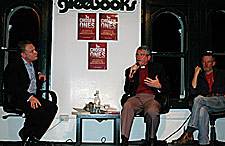
Bishop of South Sydney Robert Forsyth has congratulated the author of a controversial new book about Sydney Anglicans, saying it tells only part of the story but at least it allows people to speak for themselves.
Speaking at a Glebe bookshop last night (April 6), Bishop Forsyth joined ABC religious journalist Stephen Crittenden and Sydney Morning Herald journalist Chris McGillion to discuss Mr McGillion's new book The Chosen Ones: the Politics of Salvation in the Anglican Church (Allen and Unwin).
"It tells the story, but only at one level," the Bishop says.
"Reading it is like being underwater. Chris has mapped the surface and you can see underneath," he says adding that there's no sense of the "Christian motivation' of the two-dozen people interviewed in the book.
The Chosen Ones examines the political landscape of the Diocese from 1993 to the end of 2004. It is described as "the inside story of the take over' of the Diocese by conservative evangelicals, culminating in the 2001 election of Archbishop Peter Jensen.
It argues that Dr Jensen's leadership with that of his brother Phillip, the Dean of Sydney, and the embrace of the Diocesan Mission in parishes is nothing less than a "new reformation' that could open up a deep cultural divide in Australia.
It suggests the growth of conservatism in Sydney Diocese is linked to a general conservative swing in the life of the city, which in turn is influencing the nation.
"It's disconcerting to find oneself in a book, yet it's helpful to be given a narrative that makes sense of a larger part of your life," the Bishop said.
The book has been criticised for ignoring the lives of Sydney Anglicans at local parish level.
Despite its failings, Bishop Forsyth said, the book contains remarkably few errors of detail and serves Sydney Anglicans in asking questions of its leadership and exposing the community's human weakness and fallibility.
"There is a quite a bit of barracking that goes on in the book for one side or another. We tend to have the more factional warriors on either side some boasting of their successes, others lamenting their defeats.
"It raises very important questions for us about a realist and proper, mature Christian understanding of how institutions grow and are maintained and develop their values in a changing world. Politics, in the sense of organising, persuading, planning and so forth is inevitable and necessary in the church. But not all politics is Christian."
The Bishop answered fiery questions from the audience about Sydney Diocese's oft-criticised policies on evangelism, women's ordination, theological training and its rocky relationship with liberal Christianity.
"We dominate in a way in the way that disproportionate to our size," he said. "But every community with strong views has to have boundaries."
He said the conservative group that is described in the book as "taking over' sees the situation as a "return of harmony between the leadership of the Diocese and those who represent the heart of the diocese lost so long ago'.
"It's" the idea that we should reform ourselves as far as possible to do best what we're here to do, which is bringing people into a saving relationship with Jesus."
Mr McGillion, a Catholic, told how he first became interested in the subject after receiving a letter from Archbishop Jensen in 2002, who he said "gently' pointed out that the journalist seemed more comfortable writing about the Catholics rather than the Anglicans.
The author said it became apparent that Anglicans write books about history, not about current events in the life of their church.
"I think the great value of the book is in hearing the voices of Sydney Anglicans," he said. "Here was a fascinating story " a fascinating church, political and cultural story."

























